| Srl | Item |
| 1 |
ID:
173235


|
|
|
|
|
| Summary/Abstract |
The Central Asian states face the challenge of containing Russia’s revisionism in the post-Soviet space while maintaining cooperative relations with it and integrating diplomatically and economically into the international system. This essay argues that the Central Asian states are managing this revisionism through a strategy we refer to as ‘balancing regionalism’: cooperating among themselves and with multiple actors to insulate themselves from great power revisionist power politics and from the establishment of an exclusive sphere of influence in their region. This balancing regionalism operates through the following three mechanisms: bridging, dovetailing, and branding.
|
|
|
|
|
|
|
|
|
|
|
|
|
|
|
|
| 2 |
ID:
115400
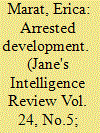

|
|
|
| 3 |
ID:
124882
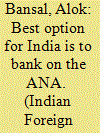

|
|
|
|
|
| Publication |
2013.
|
| Summary/Abstract |
Many analysts perceive that India should evolve a joint strategy with the Central Asian States to counter both the Taliban and Pakistani influence in Kabul. However, this has the grave disadvantage of being perceived as anti-Pakhtoon in Afghanistan's fractured ethnic mosaic. Similarly, any coalition with Iran is likely to be perceived as anti-Sunni by the dominant sect in Afghanistan. In addition, considering the current state of US-Iran relations, any relationship with Iran has a risk of running afoul of the USA. The best option for India is to bank on the ANA and pro-India politicians in Afghanistan. India must not allow it to be side-lined on Afghanistan as was done in the Turkey and London Conferences. There are many Afghan politicians who are willing to do India's bidding.
|
|
|
|
|
|
|
|
|
|
|
|
|
|
|
|
| 4 |
ID:
127659
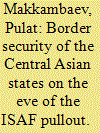

|
|
|
|
|
| Publication |
2013.
|
| Summary/Abstract |
For over 30 years now, the conflict in Afghanistan has been and remains a source of international and regional instability. The crisis developments emerging in the territory of this country threaten the border security of the Central Asian states; what will happen in Afghanistan after the ISAF pullout is causing even more concern.
The author analyzes the impact of the Afghan conflict on the border security of the Central Asian states and concludes that bilateral and multilateral efforts to preserve border security should be improved to stave off the threats that might emanate from Afghanistan.
|
|
|
|
|
|
|
|
|
|
|
|
|
|
|
|
| 5 |
ID:
143035
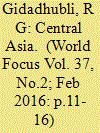

|
|
|
|
|
| Summary/Abstract |
Declaration by ISIS that the Central Asian States (CAS) will be one of the targets has been a matter of great concern not only for these concerned countries but also for those which are closely politically and economically linked with Central Asia. Hence several questions arise. Why are the CAS targets of the ISIS and what are the problems facing the CAS due to this declaration by the ISIS? What policy measures are taken by the state authorities of the CAS to deal with this situation? What are the perspectives and challenges?
|
|
|
|
|
|
|
|
|
|
|
|
|
|
|
|
| 6 |
ID:
125449
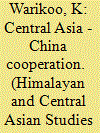

|
|
|
|
|
| Publication |
2013.
|
| Summary/Abstract |
China considers herself to be an important player in the new geopolitics of Central Asia not only because it shares nearly 3000 Kms. of it strategic frontiers in Xingjian with the Central Asian states of Kazakhstan, Kyrgyzstan and Tajikistan, but also due to cross border fraternization of Muslim population inhabiting this area, which makes borders vulnerable to ethnic religious separatism.
|
|
|
|
|
|
|
|
|
|
|
|
|
|
|
|
| 7 |
ID:
095120
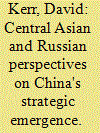

|
|
|
|
|
| Publication |
2010.
|
| Summary/Abstract |
This article employs fieldwork research and literature analysis to examine contemporary perceptions of China's emergence in popular and elite opinion in Russia and the Central Asian states, particularly Kazakhstan. It initially establishes a framework for understanding China's emergence, emphasizing a trilateral dynamic between the hegemonic position of the US in Asia, the evolution of the strategic choices of China's neighbours and the development of strategic regionalism as a mechanism for managing regional spaces. Choosing to take the Commonwealth of Independent States as a particular case of this framework, it argues that the interaction between Russia, China and the US remains highly fluid, particularly under the conditions 'of re-setting' the US-Russian relationship. This means that regional contexts are highly significant; and it establishes Central Asia as an important new strategic region for working out relations between Russia, China, and the US through their interactions with regional states. The second part of the article examines Russian and Central Asian responses to China's emergence. It looks at three categories of motivation in China's regionalism: its system for accumulative growth; its problems with weak constitutionality and transnational security in its western regions; and its concern with US/NATO encroachment on its western frontier and the US attempt to turn Central Asian elites away from their traditional alignments. The third part looks at China's promotion of the Shanghai Cooperation Organisation (SCO) as its mechanism for strategic regionalism in Central Asia. The article questions the SCO's significance in terms of its capacity for governance and functionalism, and points to the problem of institutional competition, notably with Moscow's preferred structure of the Collective Security Treaty Organization. The article concludes that China will be an unconventional superpower that presents different facets of itself in different regional contexts. There will not be a single model of China's emergence and it will continue to develop its international role through a mix of adaptation and experimentation. However, China's strategy will pose a problem for Russia and Central Asia since it seeks to create a strategic space that does not challenge the West, but exists substantially outside the West. Russia, in particular, has to decide whether it will be able to maintain its current stance of independence between Europe and Asia as China's rise shifts the frontiers between East and West.
|
|
|
|
|
|
|
|
|
|
|
|
|
|
|
|
| 8 |
ID:
139370
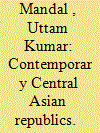

|
|
|
|
|
| Summary/Abstract |
Therefore, national policy in Central Asian States should shift from ethnocentrism to civic nationalism based on a common set of values and shared homeland. Instead of putting emphasis on historical roots, which are not only a source of pride for achievements in the past, but also a source of traumas and inter-ethnic conflicts, a focus on the contemporary achievements of the nations would be more beneficial.
|
|
|
|
|
|
|
|
|
|
|
|
|
|
|
|
| 9 |
ID:
142718
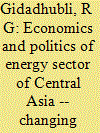

|
|
|
|
|
| Summary/Abstract |
Central Asia is one of the energy resource rich regions in the world. For the post-Soviet sovereign and independent Central Asian States (CAS), energy sector has assumed special political and economic significance during the last two decades. The leadership of the CAS has to deal with the geo-political influence of the global powers apart from the fact that their energy sector, being integrated with the global energy market, has also to deal with the cost and benefit of fluctuating international demand and price for oil.
|
|
|
|
|
|
|
|
|
|
|
|
|
|
|
|
| 10 |
ID:
118057
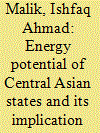

|
|
|
| 11 |
ID:
129411
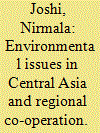

|
|
|
|
|
| Publication |
2014.
|
| Summary/Abstract |
Environmental security has become an integral component of human security. An ecological balance is essential for people to be able to lead a normal and a healthy life. Today the issue to lead a normal
life has acquired global significance and nations are discussing climate change, global warming and its likely impact on human beings, food security and biodiversity. In this regard the Central Asian States (CAS) are no exception. Since independence these States have been grappling with several issues of concerns to them. Among the environmental issues of Central Asia the most catastrophic one is the desiccation of the Aral Sea, which has now shrunk to dangerous proportions causing enormous socio-economic and health problems. At the crux of this issue is water and its inefficient management. Water management problems are also at the centre of regional politics and tensions. The Aral Sea basin encompasses all the CAS and Afghanistan. A solution to this grave problem has to be, therefore, found in a collective and a collaborative manner before it becomes worse. Is such a co-operation possible? The article examines the status of the Aral Sea and explores the possibility of a cooperative approach.
|
|
|
|
|
|
|
|
|
|
|
|
|
|
|
|
| 12 |
ID:
173332
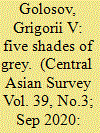

|
|
|
|
|
| Summary/Abstract |
This article overviews and seeks to explain the processes of party system formation in the post-Soviet Central Asian states (Kazakhstan, Kyrgyzstan, Tajikistan, Turkmenistan and Uzbekistan) by focusing on a crucial party-system property, fragmentation. The analysis reveals that to a much greater extent than in democracies, where party systems are largely shaped by societal factors, the level of party system fragmentation in autocracies is determined by the scope of presidential powers, as entrenched in the formal institutional order and reflected in the national constitution. The level of authoritarianism is largely inconsequential for party system fragmentation, while the role of electoral rules is secondary. Institutionally weak and institutionally strong autocratic presidents have a preference for fragmented party systems, while presidents with an intermediate range of powers seek and obtain low levels of party system fragmentation.
|
|
|
|
|
|
|
|
|
|
|
|
|
|
|
|
| 13 |
ID:
186250
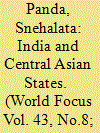

|
|
|
|
|
| Summary/Abstract |
India’s scope to actively engage with C A S was limited by the strategic interests of US and Russia as well as a hostile Pakistan , competitive China and unstable Afghanistan . India has ratcheted up its endeavour to have an independent Central Asia policy basing on its internal capabilities and reduced exter nal restraints. But challenges are not few and far between.
|
|
|
|
|
|
|
|
|
|
|
|
|
|
|
|
| 14 |
ID:
176462
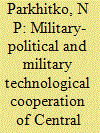

|
|
|
| 15 |
ID:
134370


|
|
|
|
|
| Summary/Abstract |
Afghanistan is often mentioned as a threat to the Central Asian states. Potential spillovers of violence, extremism, terrorism and dangers related to the drug trade are seen as significant security issues for the region. This article takes a different approach. Taking a performative view of statehood, we see state identities as socially constituted, partly by involvement in regional and global processes. From research on border management, the Northern Distribution Network, and various forms of bilateral cooperation between Afghanistan and the Central Asian states, we argue that Afghanistan has become an arena where the Central Asian states can participate. How the Central Asian states bordering on Afghanistan are treated as relevant participants, regardless of actual state capacity or the effectiveness of their policies, serves to constitute and confirm their sovereignty and relevance to the international community, and ultimately their statehood. By emphasizing the important state effects of their performance, our perspective differs from accounts of Central Asian states as either ‘weak’ or ‘strong’, and the tendency to depict Central Asian engagement in regional initiatives as mere window-dressing.
|
|
|
|
|
|
|
|
|
|
|
|
|
|
|
|
| 16 |
ID:
139726
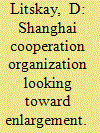

|
|
|
|
|
| Summary/Abstract |
Back in the 1990s, the SCO was a little-known forum uniting Russia. China, and a number of Central Asian states, which was dealing with the settlement of border issues on the basis of agreements on confidence-building in the military area and the mutual reductions of armed forces in the border area. The SCO Charter has only taken effect in 2003, and all major standing bodies of the Organization were only formed early in 2004.
|
|
|
|
|
|
|
|
|
|
|
|
|
|
|
|